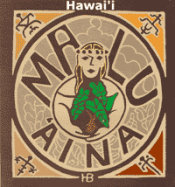Aloha ‘Aina –Mauna Kea
KAHEA: Restricting access to Mauna Kea is a First Amendment violation
The TMT project breaks ground next Tuesday, and protesters are concerned they won’t be able to demonstrate because Hawaiʻi County Police has recommended that UH close off access to Mauna Kea during the ceremony.
The Thirty Meter Telescope (TMT) project—a hotly contested issue within the state between native Hawaiians and environmental groups on one side and the University of Hawaiʻi on the other—is set to hold a ground breaking ceremony next Tuesday, October 7. This is in spite of the fact that there are still appeal options open to the groups that have been trying to block the project through the courts.
Demonstrations are planned for the Hawaiʻi State Capitol and in New York City. Rumors abound that protestors plan to show up—wearing red—at public access areas of Mauna Kea itself on Tuesday morning as well.
These rumors were not lost on the University of Hawaiʻi Office of Mauna Kea Management (OMKM), which sent out an email to Mauna Kea tour operators informing them that, “OMKM has been hearing there will be a gathering of protestors and many planning to engage in some form of civil disobedience. We do not know what is being planned, but we can anticipate road blockages, including possible vehicle blockages and road sit-ins. We anticipate picketers and hecklers.”
The email, authored by OMKM Director Stephanie Nagata, goes on to say that, “Due to the potential magnitude of the protests and presence of foreign and local dignitaries, police are highly concerned about security and crowd control.” The Hawaiʻi County Police Department recommended closing the road to all but official State, University and Observatory vehicles.
Nagata’s email was forwarded to KAHEA, The Hawaiian-Environmental Alliance, which is a plaintiff in the lawsuit against the TMT project, along with the Mauna Kea Anaina Hou, Deborah J. Ward, the Flores-Case ‘Ohana, Clarence Kukauakahi Ching and Paul K. Neves. KAHEA is concerned that closing access to public areas of Mauna Kea in order to thwart a potential demonstration is a violation of First Amendment Rights to peaceably assemble, to express free speech and to express freedom of religion.
KAHEA called OMKM to verify that the road would indeed be closed. Scotty Paiva, OMKM’s Chief Ranger, was in the Hilo office. Paiva said that OMKM reconsidered the police suggestion and there is, currently, no plan to shut down the road. However, he also said that meetings with the Hawaiʻi County Police, OMKM and the State Division of Conservation and Resource Enforcement are ongoing.
Worried that OMKM might change its mind, KAHEA asked if Paiva could inform them of any change in that decision in the days leading up to Tuesday’s ground breaking ceremony. To which Paiva said no, because he only answers to Nagata. Nagata was not in the office at the time, according to Paiva.
The Independent sent an email to the American Civil Liberties Union (ACLU) of Hawaiʻi asking if they would consider the closing of the road to be a First Amendment violation. The ACLU of Hawaiʻi recently won a First Amendment case involving a Hawaiʻi island houseless man holding a sign soliciting help. A spokesperson for ACLU Hawaiʻi said that their legal team is currently reviewing the available information.
Nelson Ho, of the Sierra Club, and Clarence “Ku” Ching are planning on sending a letter to OMKM urging them not to close the road, as restricting access to public areas of Mauna Kea to prevent a demonstration would be a violation of First Amendment rights.
Hawaii Independent Publisher Ikaika Hussey sits on the board for KAHEA.
